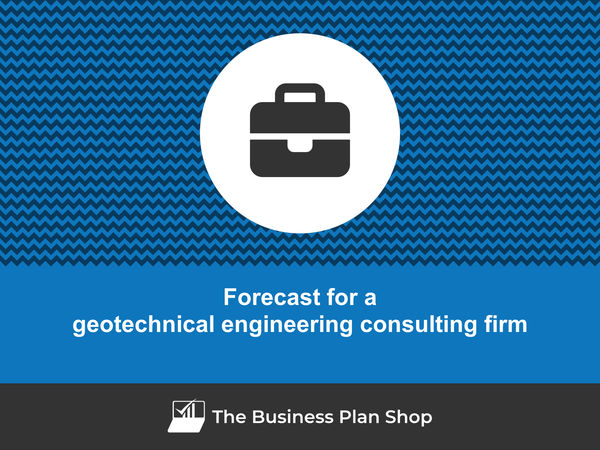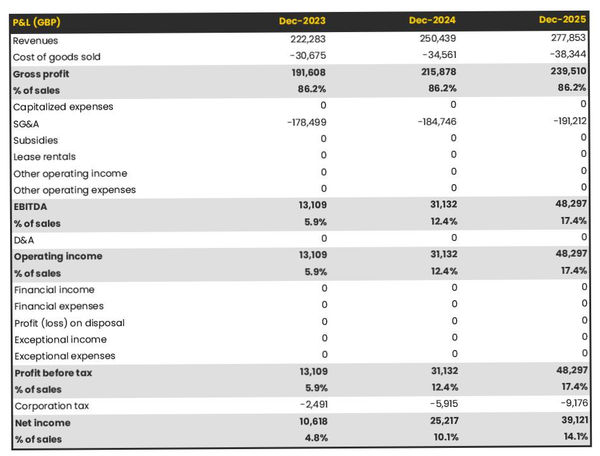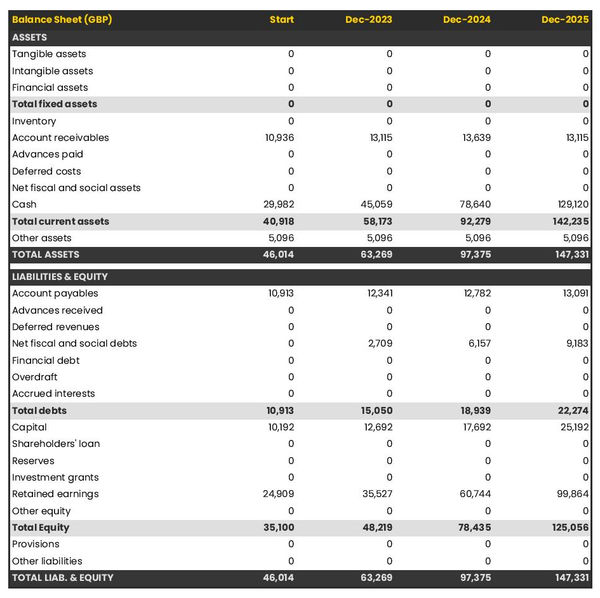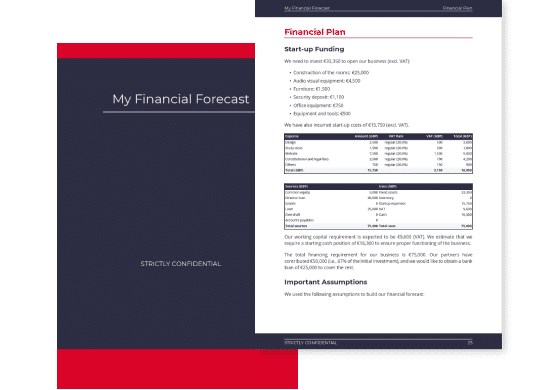How to create a financial forecast for a geotechnical engineering consulting firm?

Creating a financial forecast for your geotechnical engineering consulting firm, and ensuring it stays up to date, is the only way to maintain visibility on future cash flows.
This might sound complex, but with the right guidance and tools, creating an accurate financial forecast for your geotechnical engineering consulting firm is not that hard.
In this guide, we'll cover everything from the main goal of a financial projection, the data you need as input, to the tables that compose it, and the tools that can help you build a forecast efficiently.
Without further ado, let us begin!
Why create and maintain a financial forecast for a geotechnical engineering consulting firm?
Creating and maintaining an up-to-date financial forecast is the only way to steer the development of your geotechnical engineering consulting firm and ensure that it can be financially viable in the years to come.
A financial plan for a geotechnical engineering consulting firm enables you to look at your business in detail - from income to operating costs and investments - to evaluate its expected profitability and future cash flows.
This gives you the visibility needed to plan future investments and expansion with confidence.
And, when your trading environment gets tougher, having an up to date geotechnical engineering consulting firm forecast enables you to detect potential upcoming financing shortfalls in advance, enabling you to make adjustments or secure financing before you run out of cash.
It’s also important to remember that your geotechnical engineering consulting firm's financial forecast will be essential when looking for financing. You can be 100% certain that banks and investors will ask to see your numbers, so make sure they’re set out accurately and attractively.
Need a convincing business plan?
The Business Plan Shop makes it easy to create a financial forecast to assess the potential profitability of your projects, and write a business plan that’ll wow investors.

What information is used as input to build a geotechnical engineering consulting firm financial forecast?
A geotechnical engineering consulting firm's financial forecast needs to be built on the right foundation: your assumptions.
The data required to create your assumptions will depend on whether you are a new or existing geotechnical engineering consulting firm.
If you are creating (or updating) the forecast of an existing geotechnical engineering consulting firm, then your main inputs will be historical accounting data and operating metrics, and your team’s view on what to expect for the next three to five years.
If you are building financial projections for a new geotechnical engineering consulting firm startup, you will need to rely on market research to form your go-to-market strategy and derive your sales forecast.
For a new venture, you will also need an itemised list of resources needed for the geotechnical engineering consulting firm to operate, along with a list of equipment required to launch the venture (more on that below).
Now that you understand what is needed, let’s have a look at what elements will make up your geotechnical engineering consulting firm's financial forecast.
The sales forecast for a geotechnical engineering consulting firm
From experience, it is usually best to start creating your geotechnical engineering consulting firm financial forecast by your sales forecast.
To create an accurate sales forecast for your geotechnical engineering consulting firm, you will have to rely on the data collected in your market research, or if you're running an existing geotechnical engineering consulting firm, the historical data of the business, to estimate two key variables:
- The average price
- The number of monthly transactions
To get there, you will need to consider the following factors:
- Seasonal demand: As a geotechnical engineering consulting firm, you may experience an increase in demand for your services during certain seasons, such as spring and summer, when construction projects are more likely to take place. This could drive up your average price or number of monthly transactions as clients rush to secure your expertise during peak construction periods.
- Economic conditions: The state of the economy can greatly impact the demand for geotechnical engineering services. During a recession, clients may be less likely to invest in new construction projects, leading to a decrease in average price or number of monthly transactions. On the other hand, during a period of economic growth, clients may have more resources available for construction projects, resulting in an increase in demand for your services.
- Technological advancements: As technology continues to advance, new tools and techniques may become available that allow for more efficient and cost-effective geotechnical engineering services. This could lead to a decrease in your average price as clients are able to get the same level of service for a lower cost. However, it could also lead to an increase in the number of monthly transactions as clients are more willing to invest in geotechnical engineering services with the promise of better results.
- Competition: The presence of other geotechnical engineering consulting firms in your area can affect your average price and number of monthly transactions. If there are many competitors offering similar services, you may need to lower your prices to remain competitive. This could result in a decrease in your average price, but an increase in the number of monthly transactions as clients are drawn to your more affordable rates.
- Regulations and policies: Changes in government regulations and policies can have a significant impact on the geotechnical engineering industry. For example, new environmental regulations may require additional testing and analysis, leading to an increase in your average price. On the other hand, changes in government policies may result in more funding for infrastructure projects, leading to an increase in demand for your services and an increase in the number of monthly transactions.
Once you have an idea of what your future sales will look like, it will be time to work on your overhead budget. Let’s see what this entails.
Need a convincing business plan?
The Business Plan Shop makes it easy to create a financial forecast to assess the potential profitability of your projects, and write a business plan that’ll wow investors.

The operating expenses for a geotechnical engineering consulting firm
Once you know what level of sales you can expect, you can start budgeting the expenses required to operate your geotechnical engineering consulting firm on a daily basis.
Expenses normally vary based on how much revenue you anticipate (which is why, from experience, it is always better to start your forecast with the topline projection), and where your business is based.
Operating expenses for a geotechnical engineering consulting firm will include some of the following items:
- Staff Costs: This includes salaries, bonuses, benefits, and any other costs related to your employees. As a geotechnical engineering consulting firm, you will need to hire experienced engineers and technicians, and their salaries will be a significant portion of your operating expenses.
- Accountancy Fees: You will need to hire an accountant or outsource your accounting needs to a firm. They will help you with financial statements, tax filings, and other financial tasks. You should budget for this expense in your operating expenses forecast.
- Insurance Costs: As a consulting firm, you will need to protect your business from potential risks. This may include professional liability insurance, general liability insurance, property insurance, and workers' compensation insurance. The cost of these insurance policies should be included in your forecast.
- Software Licenses: As a geotechnical engineering consulting firm, you will need specialized software to analyze and interpret data, create reports, and manage projects. These software licenses can be expensive, so make sure to include them in your operating expenses forecast.
- Banking Fees: Your firm will have various banking needs, such as business checking accounts, credit card processing fees, and wire transfer fees. These fees can add up, so make sure to include them in your forecast.
- Rent: If you plan on having a physical office space, you will need to budget for rent. The cost will depend on the location, size, and amenities of the office space.
- Marketing and Advertising: To attract clients and promote your services, you will need to invest in marketing and advertising. This can include website development, social media marketing, and attending industry conferences and events.
- Travel Expenses: As a consulting firm, you may need to travel for client meetings, site visits, and conferences. This can include airfare, hotel accommodations, and other travel-related expenses.
- Office Supplies: You will need basic office supplies such as paper, pens, printer ink, and other supplies to run your business. Make sure to include these costs in your operating expenses forecast.
- Professional Development: To stay up-to-date with the latest industry trends and technologies, you and your employees may need to attend training and conferences. These expenses should be included in your forecast.
- Utilities: If you have a physical office space, you will need to budget for utilities such as electricity, water, and internet. These costs can vary depending on your location and usage.
- Legal Fees: You may need to consult with a lawyer for contract reviews, legal advice, or other legal matters. Make sure to include these fees in your operating expenses forecast.
- Taxes: As a business owner, you will need to pay various taxes, such as income tax, sales tax, and property tax. Consult with your accountant to estimate these costs for your forecast.
- Office Maintenance: If you have a physical office space, you will need to budget for office maintenance and repairs. This can include cleaning services, equipment repairs, and other maintenance costs.
- Employee Benefits: In addition to salaries, you may also offer benefits such as health insurance, retirement plans, and paid time off to your employees. These costs should be included in your operating expenses forecast.
This list will need to be tailored to the specificities of your geotechnical engineering consulting firm, but should offer a good starting point for your budget.
What investments are needed to start or grow a geotechnical engineering consulting firm?
Once you have an idea of how much sales you could achieve and what it will cost to run your geotechnical engineering consulting firm, it is time to look into the equipment required to launch or expand the activity.
For a geotechnical engineering consulting firm, capital expenditures and initial working capital items could include:
- Geotechnical testing equipment: To accurately assess and analyze soil and rock conditions, a geotechnical engineering consulting firm requires specialized testing equipment such as penetrometers, shear strength devices, and triaxial testing machines.
- Computer software and hardware: In today's digital age, having up-to-date software and hardware is essential for a geotechnical engineering consulting firm to efficiently manage and process data, create reports, and communicate with clients.
- Laboratory equipment and supplies: To conduct various tests and experiments on soil and rock samples, a geotechnical engineering consulting firm needs laboratory equipment and supplies such as sieves, balances, and chemicals.
- Vehicles: Depending on the size and location of the firm, vehicles may be necessary for fieldwork and site visits. This could include trucks, vans, or even off-road vehicles for remote or rugged sites.
- Office space and furniture: A geotechnical engineering consulting firm may need to invest in office space and furniture to provide a professional and functional work environment for employees, as well as meet with clients and conduct meetings.
Again, this list will need to be adjusted according to the specificities of your geotechnical engineering consulting firm.
Need a convincing business plan?
The Business Plan Shop makes it easy to create a financial forecast to assess the potential profitability of your projects, and write a business plan that’ll wow investors.

The financing plan of your geotechnical engineering consulting firm
The next step in the creation of your financial forecast for your geotechnical engineering consulting firm is to think about how you might finance your business.
You will have to assess how much capital will come from shareholders (equity) and how much can be secured through banks.
Bank loans will have to be modelled so that you can separate the interest expenses from the repayments of principal, and include all this data in your forecast.
Issuing share capital and obtaining a bank loan are two of the most common ways that entrepreneurs finance their businesses.
What tables compose the financial plan for a geotechnical engineering consulting firm?
Now let's have a look at the main output tables of your geotechnical engineering consulting firm's financial forecast.
The forecasted profit & loss statement
The profit & loss forecast gives you a clear picture of your business’ expected growth over the first three to five years, and whether it’s likely to be profitable or not.

A healthy geotechnical engineering consulting firm's P&L statement should show:
- Sales growing at (minimum) or above (better) inflation
- Stable (minimum) or expanding (better) profit margins
- A healthy level of net profitability
This will of course depend on the stage of your business: numbers for an established geotechnical engineering consulting firm will look different than for a startup.
The projected balance sheet
Your geotechnical engineering consulting firm's projected balance sheet provides a snapshot of your business’s financial position at year-end.
It is composed of three types of elements: assets, liabilities and equity:
- Assets: represent what the business possesses including cash, equipment, and accounts receivable (money owed by clients).
- Liabilities: represent funds advanced to the business by lenders and other creditors. They include accounts payable (money owed to suppliers), taxes payable and loans from banks and financial institutions.
- Equity: is the combination of what has been invested by the business owners and the cumulative profits and losses generated by the business to date (which are called retained earnings). Equity is a proxy for the value of the owner's stake in the business.

The cash flow forecast
Your geotechnical engineering consulting firm's cash flow forecast shows how much cash your business is expected to consume or generate in the years to come.

It is best practice to organise the cash flow forecast by nature to better explain where cash is used or generated by the geotechnical engineering consulting firm:
- Operating cash flow: shows how much cash is generated by the operating activities
- Investing cash flow: shows how much will be invested in capital expenditure to maintain or expand the business
- Financing cash flow: shows if the business is raising new capital or repaying financiers (debt repayment, dividends)
Keeping an eye on (and regularly updating) your geotechnical engineering consulting firm's cash flow forecast is key to ensuring that your business has sufficient liquidity to operate normally and to detect financing requirements as early as possible.
If you are trying to raise capital, you will normally be asked to provide a monthly cash flow forecast in your geotechnical engineering consulting firm's financial plan - so that banks or investors can assess seasonal variation and ensure your business is appropriately capitalised.
Need a convincing business plan?
The Business Plan Shop makes it easy to create a financial forecast to assess the potential profitability of your projects, and write a business plan that’ll wow investors.

Which tool should you use to create your geotechnical engineering consulting firm's financial forecast?
Using the right tool or solution will make the creation of your geotechnical engineering consulting firm's financial forecast much easier than it sounds. Let’s explore the main options.
Using online financial forecasting software to build your geotechnical engineering consulting firm's projections
The modern and easiest way is to use professional online financial forecasting software such as the one we offer at The Business Plan Shop.
There are several advantages to using specialised software:
- You can easily create your financial forecast by letting the software take care of the financial calculations for you without errors
- You have access to complete financial forecast templates
- You get a complete financial forecast ready to be sent to your bank or investors
- You can easily track your actual financial performance against your financial forecast, and recalibrate your forecast as the year goes by
- You can create scenarios to stress test your forecast's main assumptions
- You can easily update your forecast as time goes by to maintain visibility on future cash flows
- You have a friendly support team on standby to assist you when you are stuck
- It’s cost-efficient and much cheaper than using an accountant or consultant (see below)
If you are interested in this type of solution, you can try our forecasting software for free by signing up here.
Hiring a financial consultant or chartered accountant
Hiring a consultant or chartered accountant is also an efficient way to get a professional geotechnical engineering consulting firm financial projection.
As you can imagine, this solution is much more expensive than using software. From experience, the creation of a simple financial forecast over three years (including a balance sheet, income statement, and cash flow statement) is likely to start around £700 or $1,000 excluding taxes.
The indicative estimate above, is for a small business, and a forecast done as a one-off. Using a financial consultant or accountant to track your actuals vs. forecast and to keep your financial forecast up to date on a monthly or quarterly basis will naturally cost a lot more.
If you choose this solution, make sure your service provider has first-hand experience in your industry, so that they may challenge your assumptions and offer insights (as opposed to just taking your figures at face value to create the forecast’s financial statements).
Why not use a spreadsheet such as Excel or Google Sheets to build your geotechnical engineering consulting firm's financial forecast?
Creating an accurate and error-free geotechnical engineering consulting firm financial forecast on Excel (or any spreadsheet) is very technical and requires both a strong grasp of accounting principles and solid skills in financial modelling.
Most entrepreneurs lack the expertise required to create an accurate financial forecast using spreadsheet software like Excel or Google Sheets. As a result, it is unlikely anyone will trust your numbers.
The second reason is that it is inefficient. Building forecasts on spreadsheets was the only option in the 1990s and early 2000s, nowadays technology has advanced and software can do it much faster and much more accurately.
This is why professional forecasters all use software. With the rise of AI, software is also becoming smarter at helping us detect mistakes in our forecasts and helping us analyse the numbers to make better decisions.
Finally, like everything with spreadsheets, tracking actuals vs. forecasts and updating your forecast as the year progresses is manual, tedious, error-prone, and time-consuming. Whereas financial forecasting software like The Business Plan Shop is built for this.
Need a convincing business plan?
The Business Plan Shop makes it easy to create a financial forecast to assess the potential profitability of your projects, and write a business plan that’ll wow investors.

Use our financial forecast templates for inspiration
The Business Plan Shop has dozens of financial forecast examples available.
Our templates contain both a financial forecast and a written business plan which presents, in detail, the company, the team, the strategy, and the medium-term objectives.
Our templates are a great source of inspiration, whether you just want to see what a complete business plan looks like, or are looking for concrete examples of how you should model financial elements in your own forecast.

Takeaways
- A financial forecast shows expected growth, profitability, and cash generation metrics for your geotechnical engineering consulting firm.
- Tracking actuals vs. forecast and having an up-to-date financial forecast is key to maintaining visibility on your future cash flows.
- Using financial forecasting software is the modern way of creating and maintaining financial projections.
We hope that this guide helped you gain a clearer perspective on the steps needed to create the financial forecast for a geotechnical engineering consulting firm. Don't hesitate to contact us if you have any questions!
Need a convincing business plan?
The Business Plan Shop makes it easy to create a financial forecast to assess the potential profitability of your projects, and write a business plan that’ll wow investors.

Also on The Business Plan Shop
- Financial forecast example
- How to project sales for a business?
- Financial forecast for a business idea
Know someone who runs a geotechnical engineering consulting firm? Share our business guide with them!




